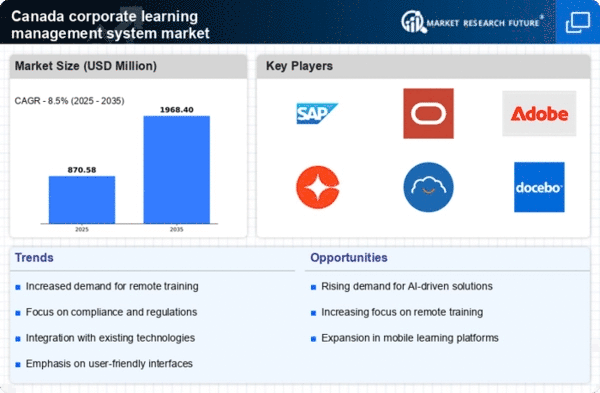Integration of Advanced Analytics
The integration of advanced analytics into the corporate learning-management-system market is emerging as a critical driver in Canada. Organizations are increasingly leveraging data analytics to assess training effectiveness and employee performance. By utilizing analytics, companies can identify skill gaps, track learning progress, and tailor training programs to meet specific needs. This data-driven approach not only enhances the learning experience but also contributes to improved business outcomes. Reports indicate that organizations utilizing analytics in their training programs see a 25% increase in employee productivity. Consequently, the corporate learning-management-system market is likely to witness growth as companies prioritize data-driven decision-making in their training initiatives.
Focus on Employee Skill Development
In the corporate learning-management-system market, there is a pronounced focus on employee skill development in Canada. As industries evolve and technology advances, organizations are recognizing the necessity of continuous learning to maintain a competitive edge. This emphasis on upskilling and reskilling is prompting companies to invest in comprehensive training programs that address both current and future skill requirements. A survey revealed that 60% of Canadian employers are prioritizing skill development initiatives to enhance workforce capabilities. This trend is expected to drive the corporate learning-management-system market as organizations seek to implement effective learning solutions that foster employee growth and adaptability.
Rising Importance of Learning Culture
The corporate learning-management-system market is being influenced by the rising importance of fostering a learning culture within organizations in Canada. Companies are increasingly acknowledging that a strong learning culture can lead to higher employee satisfaction and retention rates. By promoting continuous learning and development, organizations can create an environment where employees feel valued and motivated to enhance their skills. Research indicates that organizations with a robust learning culture experience a 30% increase in employee engagement. This cultural shift is likely to propel the corporate learning-management-system market as businesses invest in platforms that support and encourage ongoing learning and development.
Growing Demand for Remote Learning Solutions
The corporate learning-management-system market in Canada is experiencing a notable surge in demand for remote learning solutions. This trend is driven by the increasing need for flexible training options that accommodate diverse employee schedules and locations. Organizations are recognizing the importance of providing accessible learning opportunities, which can enhance employee engagement and retention. According to recent data, approximately 70% of Canadian companies are investing in digital learning platforms to facilitate remote training. This shift not only supports workforce development but also aligns with the evolving nature of work, where remote and hybrid models are becoming the norm. As a result, the corporate learning-management-system market is likely to expand significantly, catering to the needs of organizations seeking to optimize their training processes in a remote environment.
Increased Regulatory Compliance Requirements
The corporate learning-management-system market in Canada is also being driven by increased regulatory compliance requirements across various industries. Organizations are facing heightened scrutiny regarding employee training and compliance with industry standards. As a result, companies are investing in learning management systems that facilitate compliance training and ensure that employees are well-informed about regulations. Data suggests that 55% of Canadian businesses are prioritizing compliance training to mitigate risks associated with non-compliance. This trend is expected to bolster the corporate learning-management-system market as organizations seek to implement effective training solutions that address regulatory demands.
















